- Home
- Raymond Chandler
Collected Stories (Everyman's Library) Page 9
Collected Stories (Everyman's Library) Read online
Page 9
The tea dance had let out and the streets around the big hotel were a mess of cars bucking their way out from the three entrances. Dalmas got out of the taxi half a block away and walked past groups of flushed dÈbutantes and their escorts to the arcade entrance. He went in, walked up the stairs to the mezzanine, crossed the writing room and got into an elevator full of people. They all got out before the penthouse floor.
Dalmas rang Walden’s bell twice. Then he bent over and looked under the door. There was a fine thread of light broken by an obstruction. He looked back at the elevator indicators, then stooped and teased something out from under the door with the blade of a penknife. It was a flat key. He went in with it…stopped…stared .
There was death in the big room. Dalmas went towards it slowly, walking softly, listening. There was a hard light in his gray eyes and the bone of his jaw made a sharp line that was pale against the tan of his cheek.
Derek Walden was slumped almost casually in the brown and gold chair. His mouth was slightly open. There was a blackened hole in his right temple, and a lacy pattern of blood spread down the side of his face and across the hollow of his neck as far as the soft collar of his shirt. His right hand trailed in the thick nap of the rug. The fingers held a small, black automatic.
The daylight was beginning to fade in the room. Dalmas stood perfectly still and stared at Derek Walden for a long time. There was no sound anywhere. The breeze had gone down and the awnings outside the french windows were still.
Dalmas took a pair of thin suede gloves from his left hip pocket and drew them on. He kneeled on the rug beside Walden and gently eased the gun from the clasp of his stiffening fingers. It was a .32, with a walnut grip, a black finish. He turned it over and looked at the stock. His mouth tightened. The number had been filed off and the patch of file marks glistened faintly against the dull black of the finish. He put the gun down on the rug and stood up, walked slowly towards the telephone that was on the end of a library table, beside a flat bowl of cut flowers.
He put his hand towards the phone but didn’t touch it. He let the hand fall to his side. He stood there a moment, then turned and went quickly back and picked up the gun again. He slipped the magazine out and ejected the shell that was in the breech, picked that up and pressed it into the magazine. He forked two fingers of his left hand over the barrel, held the cocking piece back, twisted the breech block and broke the gun apart. He took the butt piece over to the window.
The number that was duplicated on the inside of the stock had not been filed off.
He reassembled the gun quickly, put the empty shell into the chamber, pushed the magazine home, cocked the gun and fitted it back into Derek Walden’s dead hand. He pulled the suede gloves off his hands and wrote the number down in a small notebook.
He left the apartment, went down in the elevator, left the hotel. It was half-past five and some of the cars on the boulevard had switched on their lights.
3
The blond man who opened the door at Sutro’s did it very thoroughly. The door crashed back against the wall and the blond man sat down on the floor—still holding on to the knob. He said indignantly: “Earthquake, by gad!”
Dalmas looked down at him without amusement.
“Is Miss Mianne Crayle here—or wouldn’t you know?” he asked.
The blond man got off the floor and hurled the door away from him. It went shut with another crash. He said in a loud voice: “Everybody’s here but the Pope’s tomcat—and he’s expected.”
Dalmas nodded. “You ought to have a swell party.”
He went past the blond man down the hall and turned under an arch into a big old-fashioned room with built-in china closets and a lot of shabby furniture. There were seven or eight people in the room and they were all flushed with liquor.
A girl in shorts and a green polo shirt was shooting craps on the floor with a man in dinner clothes. A fat man with nose-glasses was talking sternly into a toy telephone. He was saying: “Long Distance—Sioux City—and put some snap into it, sister!”
The radio blared “Sweet Madness.”
Two couples were dancing around carelessly bumping into each other and the furniture. A man who looked like Al Smith was dancing all alone, with a drink in his hand and an absent expression on his face. A tall, white-faced blonde weaved towards Dalmas, slopping liquor out of her glass. She shrieked: “Darling! Fancy meeting you here!”
Dalmas went around her, went towards a saffron-colored woman who had just come into the room with a bottle of gin in each hand. She put the bottles on the piano and leaned against it, looking bored. Dalmas went up to her and asked for Miss Crayle.
The saffron-colored woman reached a cigarette out of an open box on the piano. “Outside—in the yard,” she said tonelessly.
Dalmas said: “Thank you, Mrs. Sutro.”
She stared at him blankly. He went under another arch, into a darkened room with wicker furniture in it. A door led to a glassed-in porch and a door out of that led down steps to a path that wound off through dim trees. Dalmas followed the path to the edge of a bluff that looked out over the lighted part of Hollywood. There was a stone seat at the edge of the bluff. A girl sat on it with her back to the house. A cigarette tip glowed in the darkness. She turned her head slowly and stood up.
She was small and dark and delicately made. Her mouth showed dark with rouge, but there was not enough light to see her face clearly. Her eyes were shadowed.
Dalmas said: “I have a cab outside, Miss Crayle. Or did you bring a car?”
“No car. Let’s go. It’s rotten here, and I don’t drink gin.”
They went back along the path and passed around the side of the house. A trellis-topped gate let them out on the pavement, and they went along by the fence to where the taxi was waiting. The driver was leaning against it with one heel hooked on the edge of the running board. He opened the cab door. They got in.
Dalmas said: “Stop at a drugstore for some butts, Joey.”
“Okey.”
Joey slid behind his wheel and started up. The cab went down a steep, winding hill. There was a little moisture on the surface of the asphalt pavement and the store fronts echoed back the swishing sound of the tires.
After a while Dalmas said: “What time did you leave Walden?”
The girl spoke without turning her head towards him. “About three o’clock.”
“Put it a little later, Miss Crayle. He was alive at three o’clock—and there was somebody else with him.”
The girl made a small, miserable sound like a strangled sob. Then, she said very softly: “I know…he’s dead.” She lifted her gloved hands and pressed them against her temples.
Dalmas said: “Sure. Let’s not get any more tricky than we have to…Maybe we’ll have to—enough.”
She said very slowly, in a low voice: “I was there after he was dead.”
Dalmas nodded. He did not look at her. The cab went on and after a while it stopped in front of a corner drugstore. The driver turned in his seat and looked back. Dalmas stared at him, but spoke to the girl.
“You ought to have told me more over the phone. I might have got in a hell of a jam. I may be in a hell of a jam now.”
The girl swayed forward and started to fall. Dalmas put his arm out quickly and caught her, pushed her back against the cushions. Her head wobbled on her shoulders and her mouth was a dark gash in her stone-white face. Dalmas held her shoulder and felt her pulse with his free hand. He said sharply, grimly: “Let’s go on to Carli’s, Joey. Never mind the butts…This party has to have a drink—in a hurry.”
Joey slammed the cab in gear and stepped on the accelerator.
4
Carli’s was a small club at the end of a passage between a sporting-goods store and a circulating library. There was a grilled door and a man behind it who had given up trying to look as if it mattered who came in.
Dalmas and the girl sat in a small booth with hard seats and looped-back green curtains. There wer
e high partitions between the booths. There was a long bar down the other side of the room and a big juke box at the end of it. Now and then, when there wasn’t enough noise, the bartender put a nickel in the juke box.
The waiter put two small glasses of brandy on the table and Mianne Crayle downed hers at a gulp. A little light came into her shadowed eyes. She peeled a black and white gauntlet off her right hand and sat playing with the empty fingers of it, staring down at the table. After a little while the waiter came back with a couple of brandy highballs.
When he had gone away again Mianne Crayle began to speak in a low, clear voice, without raising her head: “I wasn’t the first of his women by several dozen. I wouldn’t have been the last—by that many more. But he had his decent side. And believe it or not he didn’t pay my room rent.”
Dalmas nodded, didn’t say anything. The girl went on without looking at him: “He was a heel in a lot of ways. When he was sober he had the dark blue sulks. When he was lit up he was vile. When he was nicely edged he was a pretty good sort of guy besides being the best smut director in Hollywood. He could get more smooth sexy tripe past the Hays office than any other three men.”
Dalmas said without expression: “He was on his way out. Smut is on its way out, and that was all he knew.”
The girl looked at him briefly, lowered her eyes again and drank a little of her highball. She took a tiny handkerchief out of the pocket of her sports jacket and patted her lips.
The people on the other side of the partition were making a great deal of noise.
Mianne Crayle said: “We had lunch on the balcony. Derek was drunk and on the way to get drunker. He had something on his mind. Something that worried him a lot.”
Dalmas smiled faintly. “Maybe it was the twenty grand somebody was trying to pry loose from him—or didn’t you know about that?”
“It might have been that. Derek was a bit tight about money.”
“His liquor cost him a lot,” Dalmas said dryly. “And that motor cruiser he liked to play about in—down below the border.”
The girl lifted her head with a quick jerk. There were sharp lights of pain in her dark eyes. She said very slowly: “He bought all his liquor at Ensenada. Brought it in himself. He had to be careful—with the quantity he put away.”
Dalmas nodded. A cold smile played about the corners of his mouth. He finished his drink and put a cigarette in his mouth, felt in his pocket for a match. The holder on the table was empty.
“Finish your story, Miss Crayle,” he said.
“We went up to the apartment. He got two fresh bottles out and said he was going to get good and drunk…Then we quarreled…I couldn’t stand any more of it. I went away. When I got home I began to worry about him. I called up but he wouldn’t answer the phone. I went back finally…and let myself in with the key I had…and he was dead in the chair.”
After a moment Dalmas said: “Why didn’t you tell me some of that over the phone?”
She pressed the heels of her hands together, said very softly: “I was terribly afraid…And there was something…wrong.” Dalmas put his head back against the partition, stared at her with his eyes half closed.
“It’s an old gag,” she said. “I’m almost ashamed to spring it. But Derek Walden was left-handed know about that, wouldn’t I?”
Dalmas said very softly: “A lot of people must have known that—but one of them might have got careless.”
Dalmas stared at Mianne Crayle’s empty glove. She was twisting it between her fingers.
“Walden was left-handed,” he said slowly. “That means he didn’t suicide. The gun was in his other hand. There was no sign of a struggle and the hole in his temple was powder-burned, looked as if the shot came from about the right angle. That means whoever shot him was someone who could get in there and get close to him. Or else he was paralyzed drunk, and in that case whoever did it had to have a key.”
Mianne Crayle pushed the glove away from her. She clenched her hands. “Don’t make it any plainer,” she said sharply. “I know the police will think I did it. Well—I didn’t. I loved the poor damn fool. What do you think of that?”
Dalmas said without emotion: “You could have done it, Miss Crayle. They’ll think of that, won’t they? And you might be smart enough to act the way you have afterwards. They’ll think of that, too.”
“That wouldn’t be smart,” she said bitterly. “Just smart-aleck.”
“Smart-aleck kill!” Dalmas laughed grimly. “Not bad.” He ran his fingers through his crisp hair. “No, I don’t think we can pin it on you—and maybe the cops won’t know he was left-handed…until somebody else gets a chance to find things out.”
He leaned over the table a little, put his hands on the edge as if to get up. His eyes narrowed thoughtfully on her face.
“There’s one man downtown that might give me a break. He’s all cop, but he’s an old guy and don’t give a damn about his publicity. Maybe if you went down with me, let him size you up and hear the story, he’d stall the case a few hours and hold out on the papers.”
He looked at her questioningly. She drew her glove on and said quietly: “Let’s go.”
5
When the elevator doors at the Merrivale closed, the big man put his newspaper down from in front of his face and yawned. He got up slowly from the settee in the corner and loafed across the small but sedate lobby. He squeezed himself into a booth at the end of a row of house phones. He dropped a coin in the slot and dialed with a thick forefinger, forming the number with his lips.
After a pause he leaned close to the mouthpiece and said: “This is Denny. I’m at the Merrivale. Our man just came in. I lost him outside and came here to wait for him to get back.”
He had a heavy voice with a burr in it. He listened to the voice at the other end, nodded and hung up without saying anything more. He went out of the booth, crossed to the elevators. On the way he dropped a cigar butt into a glazed jar full of white sand.
In the elevator he said: “Ten,” and took his hat off. He had straight black hair that was damp with perspiration, a wide, flat face and small eyes. His clothes were unpressed, but not shabby. He was a studio dick and he worked for Eclipse Films.
He got out at the tenth floor and went along a dim corridor, turned a corner and knocked at a door. There was a sound of steps inside. The door opened. Dalmas opened it.
The big man went in, dropped his hat casually on the bed, sat down in an easy chair by the window without being asked.
He said: “Hi, boy. I hear you need some help.”
Dalmas looked at him for a moment without answering. Then he said slowly, frowningly: “Maybe—for a tail. I asked for Collins. I thought you’d be too easy to spot.”
He turned away and went into the bathroom, came out with two glasses. He mixed the drinks on the bureau, handed one. The big man drank, smacked his lips and put his glass down on the sill of the open window. He took a short, chubby cigar out of his vest pocket.
“Collins wasn’t around,” he said. “And I was just countin’ my thumbs. So the big cheese give me the job. Is it footwork?”
“I don’t know. Probably not,” Dalmas said indifferently.
“If it’s a tail in a car, I’m okey. I brought my little coupe.”
Dalmas took his glass and sat down on the side of the bed. He stared at the big man with a faint smile. The big man bit the end off his cigar and spit it out.
Then he bent over and picked up the piece, looked at it, tossed it out of the window.
“It’s a swell night. A bit warm for so late in the year,” he said.
Dalmas said slowly: “How well do you know Derek Walden, Denny?”
Denny looked out of the window. There was a sort of haze in the sky and the reflection of a red neon sign behind a nearby building looked like a fire.
He said: “I don’t what you call know him. I’ve seen him around. I know he’s one of the big money guys on the lot.”
“Then you won’t fall ove
r if I tell you he’s dead,” Dalmas said evenly.
Denny turned around slowly. The cigar, still unlighted, moved up and down in his wide mouth. He looked mildly interested.
Dalmas went on: “It’s a funny one. A blackmail gang has been working on him, Denny. Looks like it got his goat. He’s dead—with a hole in his head and a gun in his hand. It happened this afternoon.”
Denny opened his small eyes a little wider. Dalmas sipped his drink and rested the glass on his thigh.
“His girl friend found him. She had a key to the apartment in the Kilmarnock. The Jap boy was away and that’s all the help he kept. The gal didn’t tell anyone. She beat it and called me up. I went over…I didn’t tell anybody either.”
The big man said very slowly: “For Pete’s sake! The cops’ll stick it into you and break it off, brother. You can’t get away with that stuff.”
Dalmas stared at him, then turned his head away and stared at a picture on the wall. He said coldly: “I’m doing it—and you’re helping me. We’ve got a job, and a damn powerful organization behind us. There’s a lot of sugar at stake.”
“How do you figure?” Denny asked grimly. He didn’t look pleased.
“The girl friend doesn’t think Walden suicided, Denny. I don’t either, and I’ve got a sort of lead. But it has to be worked fast, because it’s as good a lead for the law as us. I didn’t expect to be able to check it right away, but I got a break.”
Denny said: “Uh-huh. Don’t make it too clever. I’m a slow thinker.”
He struck a match and lit his cigar. His hand shook just a little.
Dalmas said: “It’s not clever. It’s kind of dumb. The gun that killed Walden is a filed gun. But I broke it and the inside number wasn’t filed. And Headquarters has the number, in the special permits.”
“And you just went in and asked for it and they gave it to you,” Denny said grimly. “And when they pick Walden up and trace the gun themselves, they’ll just think it was swell of you to beat them to it.” He made a harsh noise in his throat.

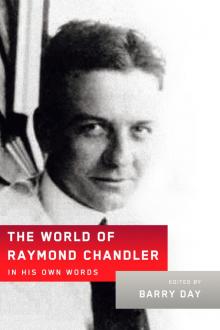 The World of Raymond Chandler: In His Own Words
The World of Raymond Chandler: In His Own Words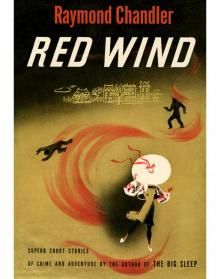 Red Wind: A Collection of Short Stories
Red Wind: A Collection of Short Stories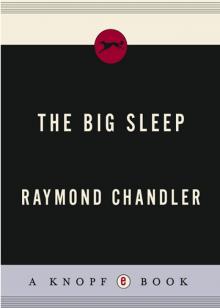 The Big Sleep
The Big Sleep Killer in the Rain
Killer in the Rain Playback
Playback The Simple Art of Murder
The Simple Art of Murder The Bronze Door
The Bronze Door The Little Sister
The Little Sister The Lady in the Lake
The Lady in the Lake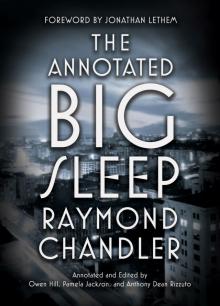 The Annotated Big Sleep
The Annotated Big Sleep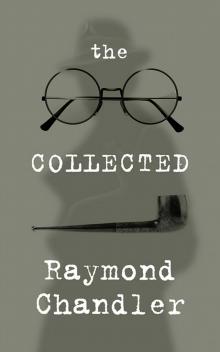 The Collected Raymond Chandler
The Collected Raymond Chandler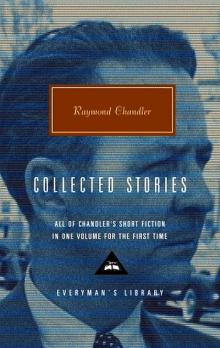 Collected Stories (Everyman's Library)
Collected Stories (Everyman's Library) Farewell, My Lovely
Farewell, My Lovely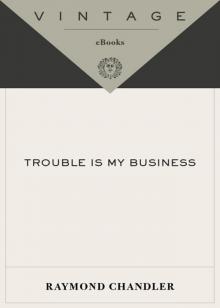 Trouble Is My Business
Trouble Is My Business The Long Goodbye
The Long Goodbye The Lady in the Lake pm-4
The Lady in the Lake pm-4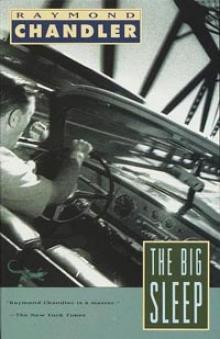 The Big Sleep pm-1
The Big Sleep pm-1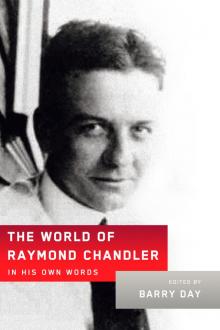 The World of Raymond Chandler
The World of Raymond Chandler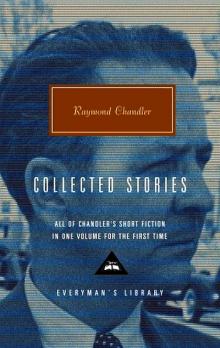 Collected Stories of Raymond Chandler
Collected Stories of Raymond Chandler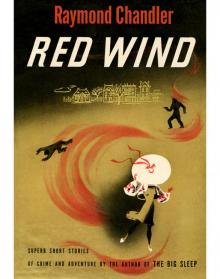 Red Wind
Red Wind Farewell, My Lovely pm-2
Farewell, My Lovely pm-2 The Raymond Chandler Papers: Selected Letters and Nonfiction, 1909–1959
The Raymond Chandler Papers: Selected Letters and Nonfiction, 1909–1959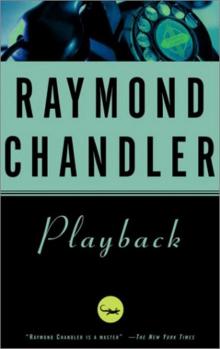 Playback pm-7
Playback pm-7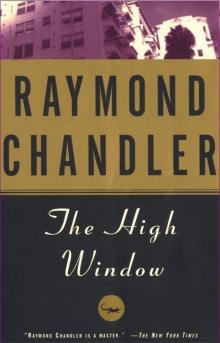 The High Window pm-3
The High Window pm-3 The Little Sister pm-5
The Little Sister pm-5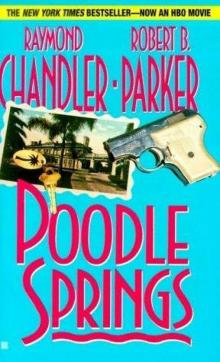 Poodle Springs (philip marlowe)
Poodle Springs (philip marlowe)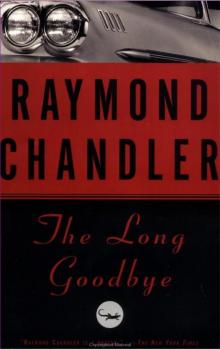 The Long Goodbye pm-6
The Long Goodbye pm-6